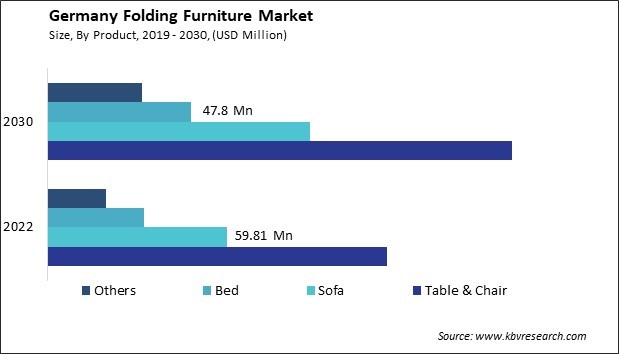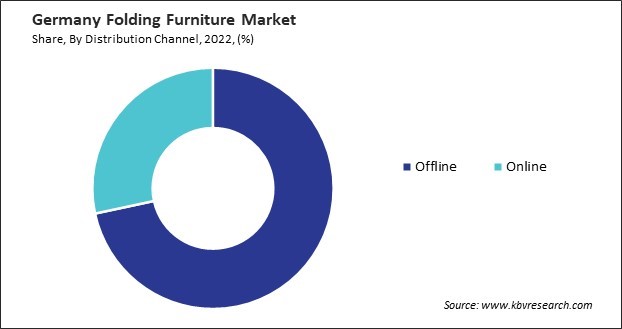The Germany Folding Furniture Market size is expected to reach $321.33 Million by 2030, rising at a market growth of 4.7% CAGR during the forecast period. In the year 2022, the market attained a volume of 1077.37 thousand units, experiencing a growth of 4.8% (2019-2022).
Germany, renowned for its innovative and efficient design principles, has witnessed a surge in the popularity of foldable furniture. This transformative trend reshapes the traditional furniture industry, providing consumers with space-saving solutions and versatile designs. The foldable furniture market in Germany has experienced significant growth in recent years, driven by increasing urbanization, smaller living spaces, and a growing preference for functional yet stylish home decor.

The COVID-19 pandemic has also impacted the e-commerce landscape, including the folding furniture market in Germany. As lockdowns and social distancing measures were implemented, there was a surge in online shopping across various industries, including furniture. Consumers turned to e-commerce platforms to fulfill their needs while adhering to safety guidelines. This shift in consumer behavior accelerated the already growing trend of online furniture shopping.
According to the International Trade Administration, in 2022, the e-commerce industry in Germany experienced robust growth, with total sales estimated at USD 141.2 billion, representing an impressive 11% increase compared to 2021. As the online population in Germany is projected to rise from 62.4 million in 2020 to 68.4 million in 2025, the foldable furniture sector is poised to benefit from this expanding digital landscape. The e-commerce industry in Germany reached a substantial 80% in 2022, ranking it the third highest globally. This shift towards online platforms is anticipated to boost further the accessibility and popularity of foldable furniture in the country.
The rise of remote work in Germany has sparked a notable shift in lifestyle and living arrangements, giving rise to a burgeoning demand for innovative and space-saving solutions in the foldable furniture market. As more individuals embrace the flexibility of working from home, the need for adaptable living spaces has become paramount. The appeal of foldable furniture lies not only in its practicality but also in its ability to blend with contemporary design aesthetics seamlessly. German consumers, known for emphasizing quality and efficiency, are increasingly drawn to these versatile pieces that offer both form and function. The demand for foldable furniture has expanded beyond traditional office spaces, influencing the residential sector and creating an industry trend that caters to diverse needs and preferences.
Manufacturers in Germany have responded to this growing demand by innovating and introducing various space-saving designs that cater to the unique requirements of the local industry. This shift in consumer behavior has not only impacted the furniture industry but has also influenced interior design choices, with more emphasis on adaptability and versatility. The flexibility of foldable furniture aligns with the dynamic nature of remote work, enabling individuals to create multifunctional spaces within their homes.
The folding furniture market in Germany has witnessed a surge in demand as consumers seek functional yet stylish pieces that can easily be stowed away or transformed to suit varying needs. Foldable furniture, including collapsible desks, chairs, tables, and storage units, has become an essential choice for those looking to optimize their living spaces, especially in urban areas where space constraints are prevalent. Thus, the surge in remote work in Germany has fueled a rising demand for foldable furniture, transforming living spaces with innovative, space-saving solutions.
In Germany, the foldable furniture market has experienced a significant surge in popularity, with foldable chairs emerging as a particularly favored choice among consumers. This increasing trend can be attributed to several factors that resonate with the German lifestyle and cultural preferences. The compact and space-saving nature of foldable chairs aligns well with the German emphasis on the efficient use of living spaces. In a country where urban living often comes with limited room sizes, the versatility of foldable furniture, especially chairs, provides a practical solution.
Moreover, the cultural inclination towards social gatherings and communal activities in Germany contributes to the high usage of foldable chairs. Germans are known for their love of outdoor events, picnics, and gatherings with friends and family. Foldable chairs are convenient for such occasions, allowing individuals to transport and set up seating arrangements in various settings easily, be it parks, gardens, or balconies.
The focus on sustainability and environmental consciousness in Germany also plays a role in the popularity of foldable furniture. Consumers appreciate the materials used in many foldable chairs, often lightweight and eco-friendly, aligning with Germany's commitment to green living. Furthermore, the transient nature of modern lifestyles, with people frequently moving for work or studies, makes foldable furniture, including chairs, an attractive option. The portability and ease of assembly and disassembly make these items convenient for individuals needing to relocate frequently. Therefore, the surging popularity of foldable chairs in Germany is attributed to their space-saving design complemented by the country's emphasis on sustainability and the demands of a transient lifestyle.

The folding furniture market in Germany is marked by a combination of traditional craftsmanship and modern design sensibilities, with several notable companies contributing to the industry. These companies offer a diverse range of folding furniture options to cater to the needs of German consumers who value functionality, space-saving solutions, and quality craftsmanship.
One of the prominent players in the German folding furniture market is Moll Funktionsmöbel, a company focusing on innovative and space-efficient furniture solutions. Moll specializes in foldable desks and tables for residential and office spaces. The company's products often feature smart mechanisms that allow for easy folding and unfolding, catering to the dynamic needs of modern living. Moll's commitment to quality and ergonomic design has made its folding furniture popular among German consumers seeking practical and versatile solutions.
Another key participant is Bretz, a German furniture manufacturer known for its distinctive designs and craftsmanship. While Bretz is recognized for its upholstered furniture, it also offers folding furniture solutions that blend style and functionality. Bretz's folding chairs and tables often showcase unique shapes and vibrant colors, appealing to consumers who seek practicality and a touch of individuality in their furniture choices.
German-based Interstuhl is a leading player in the office furniture sector, offering innovative solutions that include folding and stackable chairs. Interstuhl's folding chairs are designed for flexibility and space efficiency, making them suitable for various office settings. The company's commitment to creating ergonomic and visually appealing office furniture extends to its folding options, meeting the needs of German businesses prioritizing adaptability and modern design in their workspaces.
Hettich, a German hardware company, plays a crucial role in the folding furniture market by providing innovative hardware solutions for furniture manufacturers. Hettich's folding and sliding door systems are widely used in producing folding tables and storage units. The company's high-quality hardware components contribute to the functionality and durability of folding furniture across various brands in the German industry.
German company WAGNER, known for its design-oriented furniture, offers folding furniture that combines practicality with aesthetic appeal. Wagner's folding chairs and tables often feature innovative designs, utilizing materials such as wood and metal. The brand's focus on craftsmanship and attention to detail resonates well with German consumers who appreciate both form and function in their furniture choices.
In recent years, emerging players like Moormann have gained recognition for their contemporary approach to folding furniture. Moormann's products often feature minimalist designs and multifunctional elements, providing solutions for small living spaces. The brand's emphasis on sustainable materials aligns with the growing consumer interest in eco-friendly and responsibly sourced furniture options. These companies contribute to the folding furniture vibrancy by offering diverse and high-quality folding furniture options that meet the varied preferences of German consumers for efficient and aesthetically pleasing solutions.
By Product
By Distribution Channel
Our team of dedicated experts can provide you with attractive expansion opportunities for your business.

